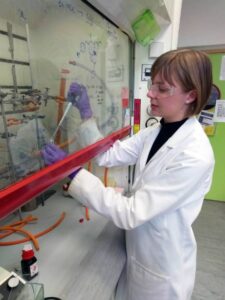Edinburgh scientists tackle brain cancer that took the life of The Wanted’s Tom Parker
Scotland’s leading brain disease charity, The Neurosciences Foundation, has launched a new initiative to tackle the brain cancer that recently took the life of The Wanted singer Tom Parker, who died at the age of 33.
It is providing preliminary funding to a team of researchers at the University of Edinburgh to enable research into glioblastoma, an adult brain tumour that has incredibly poor survival rates, with only 5% of patients surviving five years after diagnosis.
This new drive against the killer illness will be carried out by a team of experts led by Alison Hulme, Professor of Synthesis and Chemical Biology, School of Chemistry, University of Edinburgh.
A promising approach for many cancers is using immunotherapy, where the immune system is driven to attack tumours and activate inflammation. Immunotherapy has had limited success in glioblastoma patients as the tumour hijacks the immune system to support its own growth and prevents any inflammatory responses.
This project, backed by The Neurosciences Foundation, aims to develop a microscopic polymer bead able to deliver different inflammation-stimulating drugs to immune cells in the brain to activate a strong immune response. If it works, the technique might prevent further tumour growth and stimulate immune cells to attack tumour cells. This could highlight a new potential treatment for glioblastoma patients.
The Chair of The Neurosciences Foundation’s Medical Advisory Committee, Professor David Wyper, said: “The sad news of the death of Tom Parker has highlighted the huge task facing researchers in tackling glioblastoma.
“The Neuroscience Foundation’s early-stage grant of £10,000 may seem like a drop in the ocean of funding that may be required. But this is the sort of project at which the Foundation excels – identifying opportunities for new treatments and approaches and funding brilliant medical researchers and scientists to help advance progress in the field.
“Unfortunately, we don’t currently have a source of endowment funding and rely solely on contributions from the public. We wish The Hulme Research Group’s Ellen Poot all the very best as she takes this research forwards in her PhD project.”
 Lead Researcher, Professor Alison Hulme, said: “We are delighted to receive this grant which will significantly enhance the research which Ellen is conducting in her EASTBIO PhD programme. Glioblastoma is an incredibly challenging target and there are currently very few options for treatment. This funding will let us explore a wider range of immune-stimulating drugs, giving us a greater chance of success with this new approach.”
Lead Researcher, Professor Alison Hulme, said: “We are delighted to receive this grant which will significantly enhance the research which Ellen is conducting in her EASTBIO PhD programme. Glioblastoma is an incredibly challenging target and there are currently very few options for treatment. This funding will let us explore a wider range of immune-stimulating drugs, giving us a greater chance of success with this new approach.”

One Comment